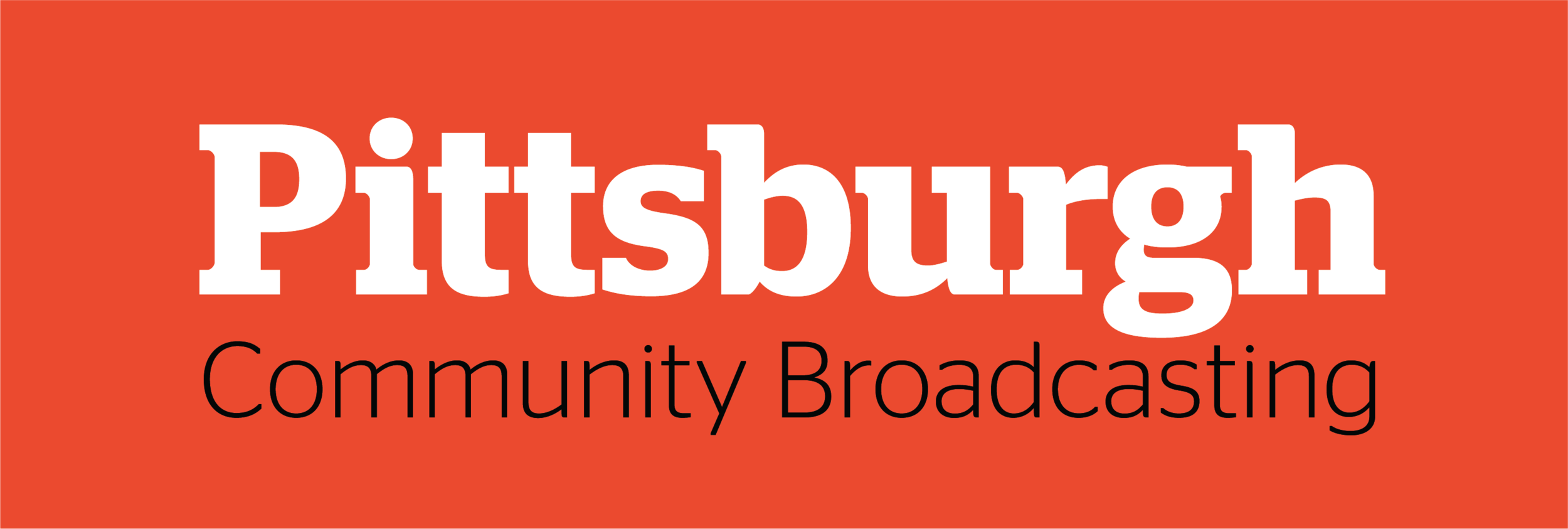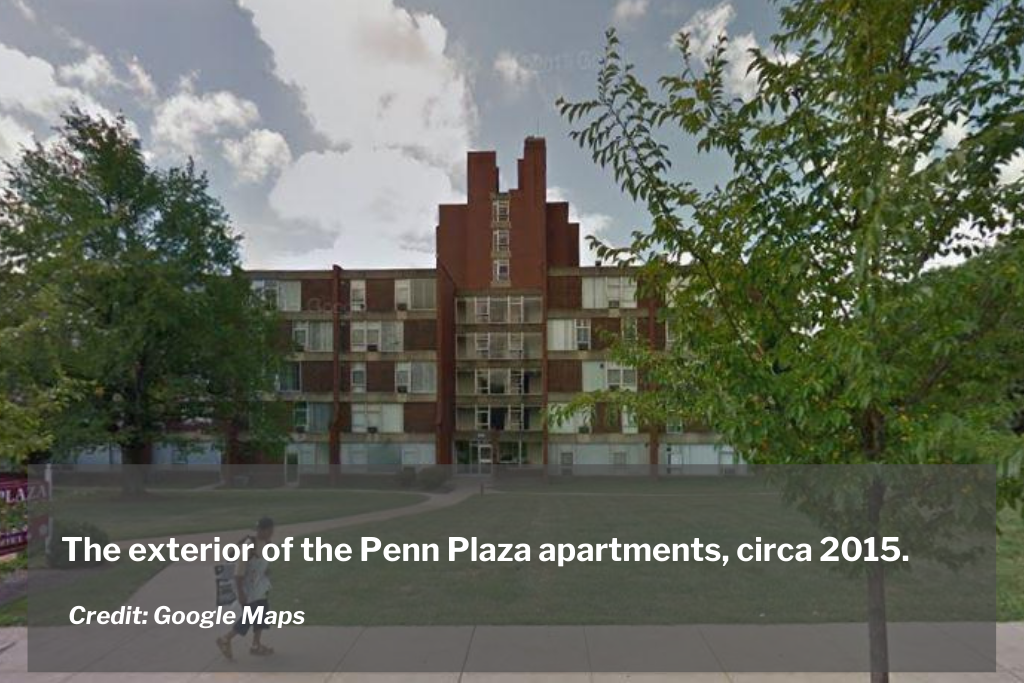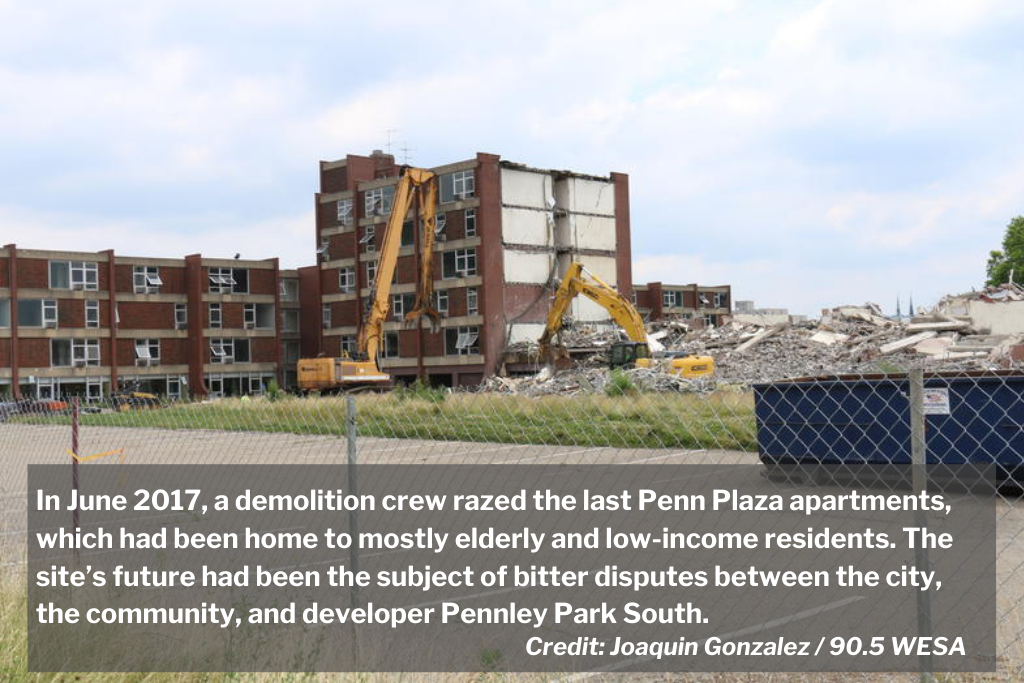From 90.5 WESA, this is Land & Power: who has it, what they do with it, and how that shapes the cities around us.
In 2015, residents of the Penn Plaza apartment buildings in Pittsburgh, Pa. learned that they’d have to leave their homes to make way for a new development. The news arrived like a pronouncement: this neighborhood, East Liberty, isn’t for you anymore.
Some people were afraid.
Some people were angry.
And some people were ready to fight.
They weren’t just fighting for their homes. They were fighting for the future of East Liberty, and Pittsburgh.
You’ve probably heard this story before, or stories like it, about people being pushed out of neighborhoods they’ve called home for years. About government officials leaping into the fray. About how cities try to balance growth and equity.
But usually these stories are told from places like New York City and Los Angeles, Miami and Nashville. Places where there really aren’t enough homes for everyone who wants to be there. But Pittsburgh is a city built for twice as many people. We lost half our population in the 1980s when manufacturing collapsed, and those people never came back. How can a city with thousands of vacant homes push people out?
It turns out, it’s not just about scarcity, it’s about choices. It’s about who’s at the table and who’s calling the shots.
In Land & Power, we’ll take you beyond what happened in East Liberty to explain how it happened. This story is one of big gambles, unlikely wins, hubris, misunderstandings and a bid to remake the city.
So often in these stories, developers are the bad guys, activists are the good guys and residents are the victims. But it’s never that simple.
Land & Power explores how one place becomes another, and what that means for the people who used to call it home. How even when everyone thinks they’re doing the right thing, people still get hurt. That hurt sticks around. And that shapes our cities, too.
Episode 1: "We don't do business this way."
In Episode one of Land & Power, we meet Bob Jamison and Gail Williams, two residents of the Penn Plaza Apartments in Pittsburgh, Pennsylvania. They react very differently to the news that they and 200 of their neighbors will have to leave their homes to make way for new development. Bob and Gail join forces to fight for their homes; chances of success seem slim.
Episode 2: "Sticks and stones"
A lot has been said in Pittsburgh about the would-be developers of the Penn Plaza Apartments, Lawrence Gumberg and his two sons, Brian and Zach. Land & Power presents the first and only comprehensive interview with the family. How did Larry Gumberg come to be viewed as a symbol for everything wrong with Pittsburgh’s resurgence? Turns out, the story everyone knows misses a lot.
Episode 3: "Put more money on the table!"
The mayor of Pittsburgh and his right hand man sit down to negotiate with Larry Gumberg and the Penn Plaza tenant council, led by Bob Jamison and Gail Williams. But what can city officials really do in scenarios like Penn Plaza? What power do cities actually have? A lot. We time travel and meet three Pittsburgh mayors whose actions set the stage for the fight over Penn Plaza.
Episode 4: "Reclaim, remain, rebuild our cities"
Late in the fight for Penn Plaza, a new group of people arrives on the scene. They look at the battle for the apartment complex and see it as a symptom of a much bigger problem: lots of people can’t afford America’s “most livable city.” They protest in the streets and pack hearing rooms, holding out hope that the buildings can be saved. An unexpected break in bureaucratic ranks presents a new opportunity for the city to make good on its promises.
Episode 5: "You have to contribute something."
Some people worry there’s another looming housing crisis in Pittsburgh. It won’t hinge on tearing down buildings, because the buildings are already gone. In the 1950s twenty-eight acres in the heart of the city was decimated by urban renewal. Now, that land is slated for redevelopment, and its future has been promised to one, private entity. Can the lessons of Penn Plaza help Pittsburgh chart a new path forward?
Reporter/Host
Margaret J. Krauss
Margaret J. Krauss is WESA's development and transportation reporter. She previously worked for Keystone Crossroads, a statewide reporting initiative that covers problems facing Pennsylvania's cities and possible solutions. Before joining Keystone Crossroads, Margaret produced a 48-part radio series about Pittsburgh's lesser-known history, biking 2,000 miles around the region to do so.
Editor
Liz Reid
Liz Reid began working at WESA in 2013 as a General Assignment Reporter and Weekend Host. Since then, she’s worked as the Morning Edition Producer, Health & Science Reporter and currently as an Editor. Liz came to Pittsburgh from KRPS public radio in Southeast Kansas, where she was a Feature Producer and the local host of All Things Considered. Previously, Liz interned and freelanced at KQED public radio in San Francisco. She has an MA in Broadcast & Electronic Communication Arts from San Francisco State University, where she also taught audio production classes. She’s done stints working in academia and the music industry, but she’s happiest in a public radio setting. When Liz is not reporting and hosting at 90.5 WESA, she likes to play baseball, cook, read and go camping.













